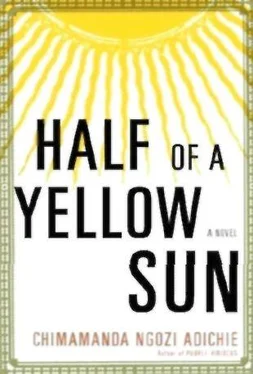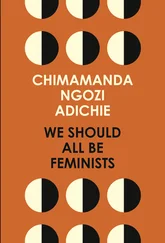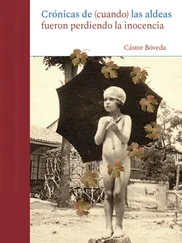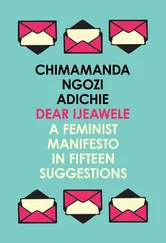"I know Odenigbo is with Manpower. I will send word to them," Father Damian said. Before he left, he slipped a wooden rosary onto Ugwu's wrist.
The rosary was there, a cold pressure against his skin, when Mr. Richard came some days later.
"Ugwu, Ugwu." The fair hair and the strange-colored eyes swam above him, and Ugwu was not sure who it was.
"Can you hear me, Ugwu? I've come to take you." It was the same voice that had asked Ugwu questions about his village festival years ago. Ugwu knew then who it was. Mr. Richard tried to help him get up and the pain shot up from his side and buttock to his head and eyes. Ugwu cried out, then clenched his teeth and bit his lip and sucked his own blood.
"Easy now, easy now," Mr. Richard said.
The bumpy ride lying in the backseat of the Peugeot 404 and the fierce sun that sparkled the windscreen made Ugwu wonder if he had died and this was what happened at death: an unending journey in a car. Finally, they stopped at a hospital that smelled not of blood but of disinfectant. Only when Ugwu lay in a real bed did he think that perhaps he was not going to die after all.
"This place has been bombed quite a bit in the past week, and we will have to leave right after the doctor sees you. He's really not a doctor-he was in his fourth year in university when the war started-but he's done very well," Mr. Richard said. "Olanna and Odenigbo and Baby have been with us in Orlu since Umuahia fell, and of course Harrison is there too. Kainene needs help at the refugee camp, so you better hurry up and be well."
Ugwu sensed that Mr. Richard was talking too much, for his benefit, perhaps to keep him awake until the doctor came. But he was grateful for Mr. Richard's laughter, the normality of it, the way it came back with a force of memory and made him inhabit the time when Mr. Richard wrote his answers in a leather-covered book.
"We all had a bit of a shock when we heard you were alive and at Emekuku Hospital — a good kind of shock, of course. Thank heavens there actually hadn't been a symbolic burial, although there was some sort of memorial service before Umuahia fell."
Ugwu's eyelids throbbed. "They said I was dead, sah?"
"Oh, yes, they did. It seems your battalion thought you had died during the operation."
Ugwu's eyes were closing and would not stay open when he forced them. Finally he got them open and Mr. Richard was looking down at him. "Who is Eberechi?"
"Sah?"
"You kept saying Eberechi."
"She is somebody I know, sah."
"In Umuahia?"
"Yes, sah."
Mr. Richard's eyes softened. 'And you don't know where she is now?"
"No, sah."
"Have you been wearing those clothes since you were wounded?"
"Yes, sah. The infantrymen gave me the trousers and shirt."
"You need a wash."
Ugwu smiled. "Yes, sah."
"Were you afraid?" Mr. Richard asked, after a while.
He shifted; the pain was everywhere and there was no comfortable position. "Afraid, sah?"
"Yes."
"Sometimes, sah." He paused. "I found a book at our camp. I was so sad and angry for the writer."
"What book was it?"
"The autobiography of a black American called Frederick Douglass."
Mister Richard wrote something down. "I shall use this anecdote in my book."
"You are writing a book."
"Yes."
"What is it about, sah?"
"The war, and what happened before, and how much should not have happened. It will be called The World Was Silent When We Died. '"
Later, Ugwu murmured the title to himself: The World Was Silent When We Died. It haunted him, filled him with shame. It made him think about that girl in the bar, her pinched face and the hate in her eyes as she lay on her back on the dirty floor.
Master and Olanna wrapped their arms around Ugwu, but lightly, without pressure, so as not to cause him pain. He felt acutely uncomfortable; they had never hugged him before.
"Ugwu," Master said, shaking his head. "Ugwu."
Baby clung to his hand and refused to let go and Ugwu's whole life suddenly gathered in a lump in his throat, and he was sobbing and the tears hurt his eyes. He was angry with himself for crying, and later, as he recounted the story of what had happened to him, he spoke in a detached voice. He lied about how he had been conscripted; he said Pastor Ambrose had pleaded with him to help carry his sick sister to the herbalist's and he was on his way back when the soldiers caught him. He used words like enemy fire and Attack HQ with a casual coldness, as if to make up for his crying.
"And they told us you were dead," Olanna said, watching him. "Maybe Okeoma is alive too."
Ugwu stared at her.
"They said he was killed in action," Olanna said. "And I got word that kwashiorkor has finally taken Adanna. Baby doesn't know, of course."
Ugwu looked away. Her news provoked him. He felt angry with her for telling him what he did not want to hear.
"Too many people are dying," he said.
"It is what happens in war, too many people die," Olanna said. "But we will win this thing. Is your pillow in a good position?"
"Yes, mah."
He could not sit on one part of his buttocks and so, during the first few weeks in Orlu, he lay on his side. Olanna was always beside him, forcing him to eat and willing him to live. His mind wandered often. He did not need the echo of pain on his side and in his buttocks and on his back to remember his ogbunigwe exploding, or High-Tech's laughter, or the dead hate in the eyes of the girl. He could not remember her features, but the look in her eyes stayed with him, as did the tense dryness between her legs, the way he had done what he had not wanted to do. In that gray space between dreaming and daydreaming, where he controlled most of what he imagined, he saw the bar, smelled the alcohol, and heard the soldiers saying "Target Destroyer," but it was not the bar girl that lay with her back on the floor, it was Eberechi. He woke up hating the image and hating himself. He would give himself time to atone for what he had done. Then he would go and look for Eberechi. Perhaps she and her family had gone to their village in Mbaise or perhaps they were here in Orlu somewhere. She would wait for him; she would know he would come for her. That Eberechi would wait for him, that her waiting for him was proof of his redemption, gave him comfort as he healed. It surprised him that it was possible for his body to return to what it had been and for his mind to function with permanent lucidity.
During the day he helped out at the refugee camp, and in the evenings he wrote. He sat under the flame tree and wrote in small careful letters on the sides of old newspapers, on some paper Kainene had done supply calculations on, on the back of an old calendar. He wrote a poem about people getting a buttocks rash after defecating in imported buckets, but it did not sound as lyrical as Okeoma's and he tore it up; then he wrote about a young woman with a perfect backside who pinched the neck of a young man and tore that up too.
Finally, he started to write about Aunty Arize's anonymous death in Kano and about Olanna losing the use of her legs, about Okeoma's smart-fitting army uniform and Professor Ekwenugo's bandaged hands. He wrote about the children of the refugee camp, how diligently they chased after lizards, how four boys had chased a quick lizard up a mango tree and one of them climbed up after it and the lizard leaped off the tree and into the outstretched hand of one of the other three surrounding the tree.
"The lizards have become smarter. They run faster now and hide under blocks of cement," the boy who had climbed told Ugwu. They roasted and shared the lizard, shooing other children away. Later, the boy offered Ugwu a tiny bit of his stringy share. Ugwu thanked him and shook his head and realized that he would never be able to capture that child on paper, never be able to describe well enough the fear that dulled the eyes of mothers in the refugee camp when the bomber planes charged out of the sky. He would never be able to depict the very bleakness of bombing hungry people. But he tried, and the more he wrote the less he dreamed.
Читать дальше












